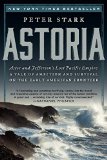Summary | Excerpt | Reviews | Beyond the Book | Readalikes | Genres & Themes | Author Bio
John Jacob Astor and Thomas Jefferson's Lost Pacific Empire: A Story of Wealth, Ambition, and Survival
by Peter Stark

Critics' Opinion:
Readers' Opinion:
First Published:
Mar 2014, 384 pages
Paperback:
Feb 2015, 400 pages
 Book Reviewed by:
Book Reviewed by:
Kim Kovacs
Buy This Book
The cultural mix of the French-Canadian fur trade changed fundamentally after 1763— a change that was reflected in the mix aboard the Tonquin— when Britain won Canada from France in the Seven Years' War. From then on, Scottish Highlanders took over management of the trade. From headquarters at Montreal, they ran long strings of wilderness trading posts from the Great Lakes deep into the North American interior, servicing them with huge birchbark canoes each paddled by ten or twelve tireless French-Canadian voyageurs.
At least three distinct cultures were jammed together on the Tonquin, cheek- by- jowl, for five or six months: the chummy Scottish fur traders, the good- time French-Canadian voyageurs, and the iron-fisted Yankee naval hero and his crew of American sailors. Captain Thorn, an unyielding disciplinarian and ardent American patriot, clearly hated the Scotsmen. And the Scotsmen, like a clannish yet argumentative family that sticks together against all outsiders, gladly— and en masse— returned the favor.
* * *
The trouble at the Falkland Islands started with a simple amusement. While the ship's cooper repaired the Tonquin's empty water casks and the sailors filled them at a spring, the Scottish partners and clerks explored and hunted ashore on the barren and unpeopled island off the tip of South America. On this particular day, as the sailors finished filling the casks and rowing them to the ship, Captain Thorn came ashore, carrying his own fowling piece, with the idea to do a little hunting himself.
Stepping from the rowboat, he spotted a gray goose standing on nearby rocks. He raised his shotgun and fired. The goose fluttered. The captain quickly reloaded and fired again. The goose fluttered again. Captain Thorn hurried over to the presumably wounded goose before it fluttered away and escaped. As he approached, he saw that the goose's leg was tied to a rock. This had been the work of one of the clerks, Farnham, who wanted to have some "sport" with it.
"[W]hen he discovered his mistake," wrote Ross, " . . . we all burst out laughing."
Captain Thorn was not amused. He spun around and immediately returned to his boat and ordered it to take him back to the Tonquin. As the captain stalked off angrily to the Tonquin after being tricked, the clerks went on carving new headboards for two old sailors graves they had discovered near the spring, and two of the Scottish partners hiked over a sand spit to hunt birds.
"While we were thus eagerly employed, little did we suspect what was going on in another quarter," reported Ross, "for, about two o'clock in the afternoon, one of our party called out, 'The ship's off!'— when all of us, running to the top of a little eminence, beheld, to our infinite surprise and dismay, the Tonquin, under full sail, steering out of the bay."
All nine of the partners and clerks stranded on the island piled into the boat— twenty feet in length, built for half that number— and took to the oars. Backs bent in unison with each grunting stroke, they rowed hard after the Tonquin, expecting that the ship would "heave to" into the wind at any moment and wait for them to catch up.
It did not. The Tonquin proceeded to sail onward, displaying full billowing canvas to the tops of the masts, into the open South Atlantic, with the clear intent, wrote Franchère, one of those madly pulling at the oars, of abandoning them "upon those barren rocks of the Falkland isles, where we must inevitably have perished."
Excerpted from Astoria by Peter Stark. Copyright © 2014 by Peter Stark. Excerpted by permission of Ecco. All rights reserved. No part of this excerpt may be reproduced or reprinted without permission in writing from the publisher.





The House on Biscayne Bay
by Chanel Cleeton
As death stalks a gothic mansion in Miami, the lives of two women intertwine as the past and present collide.

The Flower Sisters
by Michelle Collins Anderson
From the new Fannie Flagg of the Ozarks, a richly-woven story of family, forgiveness, and reinvention.

The Funeral Cryer by Wenyan Lu
Debut novelist Wenyan Lu brings us this witty yet profound story about one woman's midlife reawakening in contemporary rural China.
Your guide toexceptional books
BookBrowse seeks out and recommends the best in contemporary fiction and nonfiction—books that not only engage and entertain but also deepen our understanding of ourselves and the world around us.